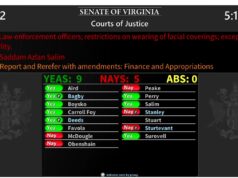It is never too early to start playing the political junkie’s favorite presidential year game, speculating about who will be Hillary’s pick for vice president. Actually, I have been doing this for several months with my Facebook friends, who are mostly as addicted as I am.
They have come up with strong contenders including Elizabeth Warren, Julian Castro, Thomas Perez, Sherrod Brown, and, of course, Tim Kaine.
I have to admit Elizabeth Warren intrigues me and I was leaning toward her for a while. She is a charismatic populist firebrand with the ability to light up the currently unenthusiastic progressive base. When she and Clinton were out campaigning recently, it was obvious while watching them that they were having a great time bashing Trump and the chemistry was palpable between them and the audience. With Warren on the ticket, there would be no enthusiasm gap with the activist base.
But Warren is a powerful voice in the Senate who might be more effective as a rising star in leadership there. Plus her state has a Republican governor who would appoint a temporary replacement for her in a Senate that teeters at the brink of turning blue again. Do we really want to give that up and hamstring Hillary with a Republican Congress? We have a chance to take back the Senate and possibly even the House at this point.
Sherrod Brown is another reliably progressive choice who has run well in Ohio. But the same argument holds for him, probably even more strongly. Like Warren, he has a Republican governor who will point his replacement and Ohio is even swingier and more purple than Massachusetts.
Julian Castro, on the other hand, is a young, rising star with solid roots in the Latino community. But he’s also very inexperienced, having served only as mayor of San Antonio. He is not a proven vote getter yet, having never won a statewide race and he is certainly not ready to step into the presidency in an emergency, an important criterion for Clinton, according to those close to her.
The same can be said of Secretary of Labor Tom Perez. I heard him at the recent JJ Dinner in Richmond and he blew me away with an impassioned speech. But he too has never won a statewide election. In addition, Maryland, his home, is already blue and won’t go for Donald Trump. Just as Castro’s Texas is deep red and most probably will be Trump territory. So, neither candidate really even brings his home state into the mix, one because it’s already blue and the other because it’s reliably red.
That leaves Tim Kaine. I will get to why he’s an attractive choice in a minute, but first let’s go over some of his drawbacks.
He does not excite many progressives, especially outside of his home state. He is not that well known outside of Virginia and Beltway political circles. And he has some baggage. Indeed, I saw one Facebook post complain about his moderate stand on abortion. The complaint was that he was insufficiently liberal on the issue.
According to Darren Samuelsohn and Daniel Strauss in this July 4 article in Politico, in 2005, Tim Kaine promised to reduce the number of abortions through adoptions and abstinence based education. NARAL withheld their endorsement, but condemned the far more extreme anti-abortion stand of Kaine’s gubernatorial opponent, Jerry Kilgore, who wanted to outright ban abortion and overturn Roe v. Wade, something Kaine never suggested.
But in 2007, NARAL called Kaine a “mixed choice and in 2009, Kaine was criticized for signing into Virginia law the Choose Life license plate.
Kaine defended that as a free speech issue, and as pro-choice as I am, I would agree with that call. I have an AFL-CIO license plate, and I would hate to be prevented from keeping it because an anti-labor governor was elected in Virginia. The whole point of supporting free speech is defending it even when you disagree with the speaker’s content.
Tim Kaine does straddle a precarious dilemma of being personally opposed to abortion, as a Catholic, but supporting a woman’s right to make her own decision, not to mention separation of church and state. But in recent years, he has occupied the more progressive ground more comfortably.
Since 2012, his voting record with NARAL has been 100 percent. He has joined fellow Democrats in demanding Obamacare include greater access to abortion and in opposing Republican efforts to defund Planned Parenthood. Further, he co-sponsored a bill prohibiting states from putting restrictions on abortion. As fellow Catholic abortion rights supporter Susan Collins, a Republican, said, “It’s possible to feel strongly on a personal level about the decisions one would make in one’s own life while embracing the notion that a public policy position may not be in accord with decisions that you’d make,”
In other words, one can be a good Catholic and uphold the constitutional separation of church and state.
Ironically, though, this one supposed weakness in Kaine’s resume, his Catholic conscience on abortion, is also his greatest strength. Tim Kaine’s resume includes a stint as an idealistic young man working as a missionary for the Jesuits in Honduras. Because of that experience, he is fluent in Spanish, which would help in the Hispanic community.
He has also remained true to his Catholic social teachings on a range of issues such as economic justice and championing the poor and working class. Given the prominent role that issues like income inequality, wage stagnation, and the hollowing out of the middle class will play in this year’s election, Kaine already has a track record for supporting progressive bread and butter policies.
He also has roots in the battleground Midwest, born in St. Paul, Minnesota and raised in Kansas City, Missouri. And of course, he brings his current home state of Virginia to the table as a VP candidate. Virginia is a purple swing state, and Kaine is popular enough here to tip it into Hillary Clinton’s corner. Republicans do not believe they can win without Virginia, and I am inclined to hope they are right and to prevent them from winning Virginia.
More important, Kaine has served as mayor of Richmond, governor of Virginia, and as U.S. Senator. He has political experience at the local, state, and federal level, including at the executive level. He could walk into the VP position ready to serve if need be. I suspect for Hillary Clinton that may be one of her most important considerations tipping the scales in his favor. It certainly does that for me.



![CNU Wason Center Poll of Virginia: Trump Approval at Just 34%; “narrow majority support a constitutional [redistricting] amendment”](https://bluevirginia.us/wp-content/uploads/2026/01/wason0128-1-238x178.jpg)







